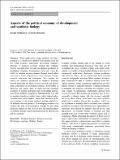| dc.contributor.author | Wellhausen, Rachel | |
| dc.contributor.author | Mukunda, Gautam | |
| dc.date.accessioned | 2013-12-06T16:08:38Z | |
| dc.date.available | 2013-12-06T16:08:38Z | |
| dc.date.issued | 2009-10 | |
| dc.date.submitted | 2009-06 | |
| dc.identifier.issn | 1872-5325 | |
| dc.identifier.issn | 1872-5333 | |
| dc.identifier.uri | http://hdl.handle.net/1721.1/82662 | |
| dc.description.abstract | What implications might synthetic biology’s potential as a wholly new method of production have for the world economy, particularly developing countries? Theories of political economy predict that synthetic biology can shift terms of trade and displace producers in developing countries. Governments, however, retain the ability to mitigate negative changes through social safety nets and to foster adaptation to some changes through research, education and investment. We consider the effects the synthetic production of otherwise naturally derived molecules are likely to have on trade and investment, particularly in developing countries. Both rubber in Malaysia and indigo dyes in India provide historical examples of natural molecules that faced market dislocations from synthetic competitors. Natural rubber was able to maintain significant market share, while natural indigo vanished from world markets. These cases demonstrate the two extremes of the impact synthetic biology might have on naturally derived products. If developing countries can cushion the pain of technological changes by providing producers support as they retool or exit, the harmful effects of synthetic biology can be mitigated while its benefits can still be captured. | en_US |
| dc.description.sponsorship | National Science Foundation (U.S.). Integrative Graduate Education and Research Traineeship | en_US |
| dc.description.sponsorship | Synthetic Biology Engineering Research Center | en_US |
| dc.language.iso | en_US | |
| dc.publisher | Springer-Verlag | en_US |
| dc.relation.isversionof | http://dx.doi.org/10.1007/s11693-009-9032-9 | en_US |
| dc.rights.uri | http://creativecommons.org/licenses/by/3.0/ | en_US |
| dc.source | PMC | en_US |
| dc.title | Aspects of the political economy of development and synthetic biology | en_US |
| dc.type | Article | en_US |
| dc.identifier.citation | Wellhausen, Rachel, and Gautam Mukunda. “Aspects of the political economy of development and synthetic biology.” Systems and Synthetic Biology 3, no. 1 4 (December 10, 2009): 115-123. | en_US |
| dc.contributor.department | Massachusetts Institute of Technology. Center for International Studies | en_US |
| dc.contributor.department | Massachusetts Institute of Technology. Department of Political Science | en_US |
| dc.contributor.mitauthor | Wellhausen, Rachel | en_US |
| dc.contributor.mitauthor | Mukunda, Gautam | en_US |
| dc.relation.journal | Systems and Synthetic Biology | en_US |
| dc.eprint.version | Final published version | en_US |
| dc.type.uri | http://purl.org/eprint/type/JournalArticle | en_US |
| eprint.status | http://purl.org/eprint/status/PeerReviewed | en_US |
| dspace.orderedauthors | Wellhausen, Rachel; Mukunda, Gautam | en_US |
| dc.identifier.orcid | https://orcid.org/0000-0001-9227-5180 | |
| mit.license | PUBLISHER_CC | en_US |
| mit.metadata.status | Complete | |
